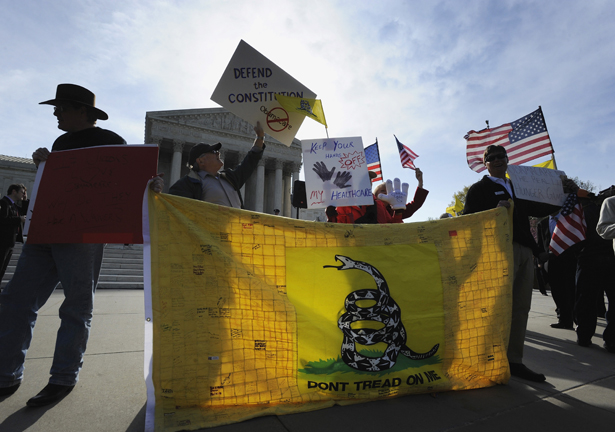
Reuters/Jonathan Ernst
My emotions after the Supreme Court’s ruling on the Affordable Care Act last week went through various stages: confusion (thanks, CNN), shock and finally sheer joy. It was a complete surprise to have the highest court uphold the entire law, including the individual mandate. Liberals rightly celebrated the ruling as a historic step toward ensuring a better quality of life for all Americans.
But in the jubilation hangover, some more sober analysis has taken its place. One important aspect of the Court’s decision gives no reason to celebrate: the ruling that the federal government can’t withdraw all Medicaid funds from governors who refuse to expand Medicaid rolls in their states, essentially making it possible for them to opt out. The Medicaid expansion is meant to give coverage to about 17 million Americans by 2019, accounting for almost half of the 32 million people the bill promised to insure. Yet as Sarah Kliff reported, if states opt out of expanding Medicaid, it could leave some of the poorest Americans stuck in a no-man’s land in which they don’t qualify for Medicaid but also don’t qualify for subsidies to buy insurance. Beyond literally being a matter of life or death for many uninsured Americans, it’s also an economic issue: the White House calculated that expanding the number of Americans with insurance would increase economic well-being by about $100 billion a year, or about two-thirds of a percent of GDP.
It seems foolhardy for governors to reject what is basically free money to help more people in their own states gain health insurance. Josh Barro wrote just after the ruling that while the White House’s stick was taken away, its carrot—the federal government’s picking up 100 percent of the states’ Medicaid expansion tab for the early years, gradually declining to 90 percent after that—would be enough to incite states to participate. And they stand to see other economic benefits. States that already provide coverage and care to people living at 133 percent of the poverty line would no longer shoulder those costs, saving them millions. Even for those that don’t offer such coverage, the bill stands to save all states money by getting rid of the “hidden tax” they pay in higher insurance premiums that account for the cost of covering the uninsured, also potentially saving millions.
Popular
"swipe left below to view more authors"Swipe →
Yet Republican governors are already contemplating rejecting the money. The Hill reported this week that fifteen governors are either flat-out planning to reject the Medicaid expansion money or are leaning in that direction. Firm nos have come from Florida, Iowa, Kansas, Louisiana, Nebraska, South Carolina and Wisconsin. Eight more are still undecided yet appear to be following suit: Alabama, Georgia, Indiana, Mississippi, Missouri, Nevada, Texas and Virginia. Yet Brian Beutler reports today that these very states have some of the country’s highest uninsured rates and would stand to see the biggest benefits. Florida ties with Nevada and New Mexico in second to last place in the country at 21 percent uninsured, and South Carolina and Louisiana come in with 19 and 17 percent rates, respectively.
An indignant refusal of federal money in these states may sound familiar. Alabama, Louisiana, Mississippi, South Carolina and Texas were among the handful of states to say they would reject federal stimulus money way back in early 2009. The argument was similar back then: as with the Medicaid expansion money, the states were expected to change some policies to protect more of their residents from economic harm. In the case of the stimulus money, they had to expand unemployment benefits to more people. That’s what made GOP governors too cranky to accept the funds. Eventually all fifty accepted federal funds, although some still turned away the money meant to increase those unemployment benefits. Meanwhile, the last holdout, South Carolina, had the nation’s second-highest unemployment rate at the time that it was contemplating rejecting the funds on ideological grounds.
But other federal money was later rejected outright. After President Obama’s 2010 State of the Union, he called for building a high-speed rail network and pledged $8 billion in stimulus money for rail projects in various states. Yet four Republican governors—New Jersey’s Christie, Wisconsin’s Walker, Ohio’s Kasich and Florida’s Scott—refused to take money for the projects. They would have created tens of thousands of jobs in each state—an estimated 16,000 in Ohio, 10,000 in Wisconsin and 10,000 in Florida.
Meanwhile, as research my colleague Mike Konczal and I conducted showed, ultraconservative Republican governors across the country have been enacting policies that hurt their economies, and therefore the entire economy, in other ways. In the midst of a massive jobs crisis, the eleven states that flipped red after the 2010 midterms and Texas accounted for 70 percent of public sector job losses last year, either laying off or pushing these workers out through attrition. The rest of the states lost only an average of .5 percent of their government workforces. Without these massive waves of job losses, our unemployment rate would likely be closer to 7 percent.
What ties all of these conservative state-level actions together? An adherence to ideology over what’s best for the economy—even their own state economies. The belief that government spending should be shrunk at all costs has steamrolled over policies that shouldn’t be about party affiliation. Taking federal money for much-needed updates to our infrastructure that would also create thousands of jobs is clearly the right choice. Throwing government workers out of their jobs at a time of sky-high unemployment is clearly the wrong choice. And now these conservative states are threatening to keep millions of Americans out of health insurance policies because they worry about higher state spending in the long run. This despite the fact that their residents and their budgets stand to see huge benefits now. The Republican Party’s abhorrence of government is driving bad economic decision-making—and that’s hurting all of us.


